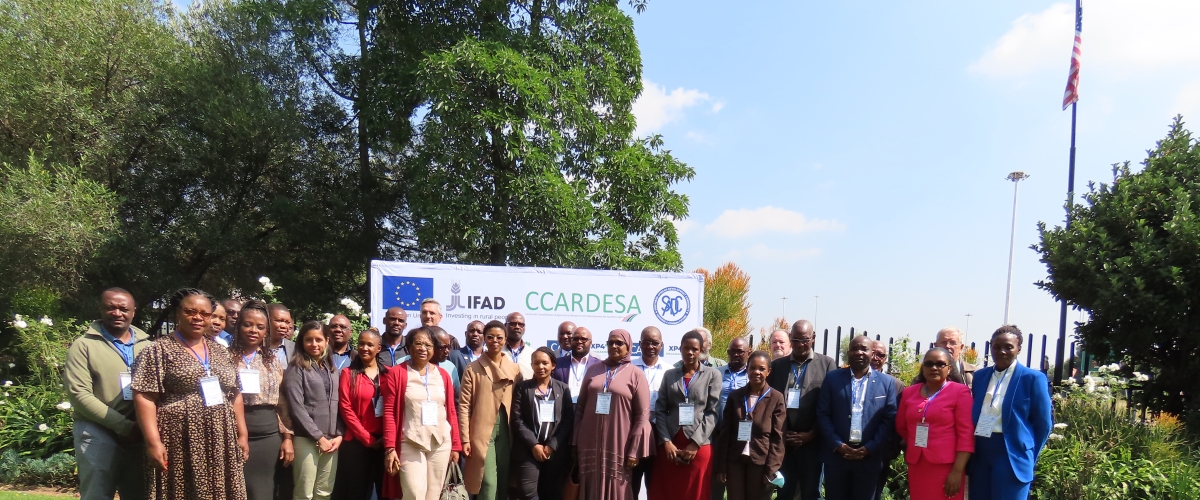
The Centre for Coordination of Agricultural Research and Development for Southern Africa (CCARDESA), through its CAADP-XP4 Programme, is conducted a Proposal Development Writeshop at the Southern Sun Hotel, South Africa from 17th to 21st April 2023. The meeting was supported by the CAADP-XP4 Programme which is funded by the European Union (EU) and administered by the IFAD. The Programme supports the implementation of climate-relevant interventions in the region.
The main aim of the write-shop was to support CCARDESA's resource mobilization efforts by developing proposals under the guidance of field experts/specialists. The developed proposals are categorized into five thematic areas: Forestry and Apiculture, Agroforestry and Agroecology, Fisheries and Aquaculture, Miombo, and Climate change and Livestock. The participants were tasked to draft at least ten proposals/concept notes during the Writeshop. Besides developing new project proposals under the five themes, the exercise included adapting existing climate-relevant concept notes and proposals to fit the existing calls for proposals.
CCARDESA Executive Director, Prof. Cliff Dlamini, gave welcoming remarks where he urged the workshop participants to develop bankable proposals to address the urgent diverse needs of the SADC member states. "It is my sincere hope that at the end of the four days, we need to produce programmes that will positively impact the people,” intimated Prof. Dlamini.
He further stressed that the partnerships CCARDESA has developed with the participants should go a long way in ensuring joint programme development and implementation takes place now and into the future.
Dr Frank Kayula, the Chair of the Programmes Committee on the CCARDESA Board, officially opened the Proposal Development meeting. He alluded to the challenges that small scale farmers face in the SADC. He called for impactful and solution-based programmes that would improve the livelihood of the farmers.
The CAADP-XP4 Coordinator Dr Baitsi Podisi gave an overview of CCARDESA and the CAADP-XP4 Programme. He urged participants to align proposals to the CCARDESA thematic areas as they develop the proposals. This is to ensure that they are in line with SADC protocols and policy frameworks.
Dr Podisi shared a brief background about how the CCARDESA research agenda was developed. He also highlighted that each SADC Member country was consulted to identify priority R&D issue to formulate the SADC Multi-country Agricultural Productivity Programme (SADC MAAP) which proposed themes that CCARDESA adopted. The issues which were common to two or more countries were regarded as regional priorities, which informed the themes for CCARDESA medium-term operational plan (2013 - 2018) . He also mentioned that the SADC Regional Agricultural Policy (SADC -RAP) and the Regional Indicative Strategic Development Programme (RISDP) which inform the CCARDESA themes.
Dr Podisi bemoaned the low performance of African countries in the 3rd CAADP Biannual Review Report despite the Africa countries having made a commitment to meet the Malabo commitments.
The Proposal Development Writeshop was essential to achieving CCARDESA's goal of supporting agricultural research and development in the SADC Region. CCARDESA hopes to mobilize the resources needed to advance agriculture and improve food security in the region by bringing together participants with the skills and knowledge to develop fundable proposals.
The Writeshop was expected to contribute towards impacting the agricultural research and development sector in Southern Africa, and participants were excited about the opportunity to share knowledge and learn from each other. A total of 9 draft proposals were developed during the meeting.
The workshop had representatives of national partners from the CAADP-XP4 implementing countries, which include Botswana, Eswatini, Mozambique, Namibia, Tanzania, Zambia, and Zimbabwe, with the addition of Malawi and Madagascar. Other representatives included Academia, NGOs, the Donor Community, the Private Sector, Researchers, Civil Society and representatives from the Ministries of Agriculture, Fisheries and Fo





